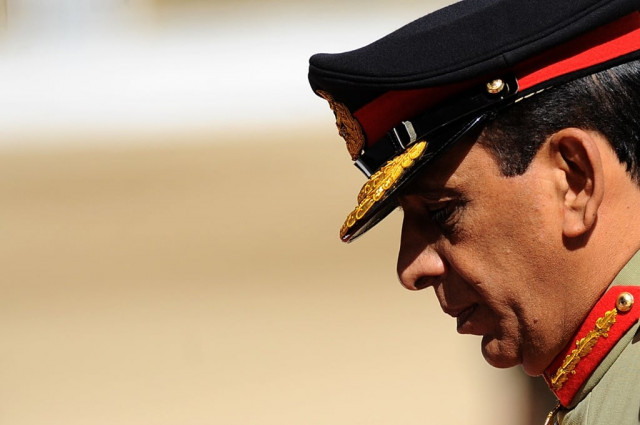Search is on for new army chief
The highest-ranking contender is Lieutenant General Haroon Aslam, currently the chief of logistics staff.

Chief of Army Staff General Ashfaq Parvez Kayani. PHOTO: AFP
General Ashfaq Kayani confirmed on Sunday that he will step down as scheduled on November 29, scotching rumours he was to keep a hand on the reins in some new role.
Four lieutenant generals are seen as in the hunt to lead the 600,000-strong army - widely considered the most powerful job in Pakistan.
Whoever is chosen will take over with the country facing an array of daunting challenges both domestically and internationally - proposed talks with homegrown militants, vexed relations with India and the role Pakistan wants to play in promoting peace in Afghanistan.
Analysts said that the new man is likely to maintain Kayani's pragmatic approach to relations with the United States and his attitude of not opposing civilian efforts to improve ties with old enemy India.
Prime Minister Nawaz Sharif - whose last appointment as army chief, general Pervez Musharraf, deposed him in 1999 - will choose the new chief from a shortlist prepared by Kayani, who was appointed in 2007 and given an extension in 2010.
The highest-ranking contender is Lieutenant General Haroon Aslam, currently the chief of logistics staff.
Aslam took part in army operations against the Taliban in Swat in 2009 and served as chief of the paramilitary Rangers in Punjab.
Behind Aslam in rank but seen by some commentators as favourite for the job, particularly if Aslam is made chairman of the joint chiefs of staff committee, is Lieutenant General Rashad Mehmood, currently chief of general staff at the army's General Headquarters.
The other main runners are Lieutenant General Raheel Sharif, whose elder brother won the highest military award for valour in the 1971 war with India, and Lieutenant General Tariq Khan, who has taken part in successful counter-insurgency operations and has earned a reputation as an excellent field commander.
The May general election marked a major landmark for Pakistani democracy - which has been punctuated by three military coups - as the first time an elected government completed its term and handed over power through the ballot box.
Much credit was given to Kayani for resisting the temptation to meddle in politics and as he confirmed his retirement he stressed that the armed forces "fully support and want to strengthen" democracy.
Security analyst Imtiaz Gul said he expected this to continue.
"The army and its chief will have to follow whatever the civilian leadership defines," he told AFP.
"Kayani's tenure as army chief marks a huge step forward in Pakistan's democratic transition because he has set new benchmarks for depoliticising the army's role."
The outgoing army chief is said to enjoy close ties with the US and played a key role in ordering and supervising operations against Taliban and al Qaeda linked militants in the northwest.
Pakistan has a vital part to play as the US-led Nato force in Afghanistan withdraws combat troops by the end of 2014 and the new army chief's relations with the Americans will be crucial.
Despite seething anti-US sentiment on the streets and several years of difficult relations with Washington, the military still enjoys significant American support.
"I don't think any army chief can be anti-American, as a lot depends on American assistance as well as equipment and technical support they are providing to Pakistan," defence analyst and retired general Talat Masood told AFP.
"Any one of the four officers who is appointed army chief will maintain functional and cooperative relations with the US."
Analyst Hasan Askari agreed, noting that the four likely candidates are well established officers - there are no wildcard outsiders.
Nawaz came to power promising to improve relations with India, though recent clashes in disputed Kashmir have threatened his good intentions.
With the army engaged in fighting homegrown militants in tribal areas along the Afghan border, Masood said he expected Kayani's replacement to support efforts to cool tensions to the east.
"He would certainly seek to normalise ties with India to focus more on the western border because the army remains highly stretched and it is difficult for them to be engaged on two fronts at the same time," Masood said.
Less clear is how the struggle with homegrown Taliban militants will proceed.
Nawaz has mooted talks, but both he and Kayani have stressed the insurgents must accept the constitution, which they seem unwilling to do, and a recent bloody spate of attacks has seriously undermined public support for the idea.






1724319076-0/Untitled-design-(5)1724319076-0-208x130.webp)












COMMENTS
Comments are moderated and generally will be posted if they are on-topic and not abusive.
For more information, please see our Comments FAQ